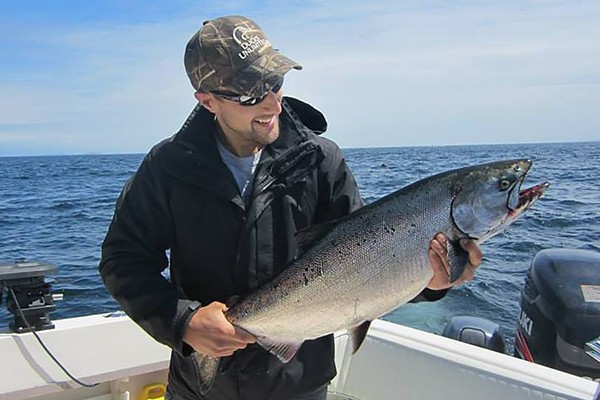 Master’s student Mitch Dender’s research is part an assessment of Chinook salmon to benefit both conservation and the aquaculture industry.
Master’s student Mitch Dender’s research is part an assessment of Chinook salmon to benefit both conservation and the aquaculture industry.
We have all been instructed to be on our best behaviour while in school. Well apparently, it’s also valuable on farms — even for fish.
Research at the Great Lakes Institute for Environmental Research hopes to promote traits which make salmon easier to farm, making them more profitable for producers and more affordable for consumers.
Master’s candidate Mitch Dender says large-scale commercial fish farms are burgeoning as demand for salmon exceeds their natural populations.
“As people continue to demand more fish protein, we must find another alternative to wild fishing,” he says. “By optimizing and determining which traits promote growth, we are selecting for fish that work best in aquaculture.”
He is investigating the ideal traits in Chinook salmon to encourage the growth of healthier fish and keep farms more ecologically sustainable. Life in aquaculture differs from living in the wild. Dender targets specific behaviours and hormones that optimize growth in a captive environment.
“We found there are specific interactions between behaviours and the stress hormone cortisol, which seem to optimize growth in this very specific environment,” he says. “By looking at the combination of multiple working parts, in regards to behaviour and hormones, we can better understand how these animals adapted and thrive in a foreign environment such as captivity.”
Dender, who completed his undergraduate degree at the University of Windsor in 2014 before moving on to his masters project, has looked at the daily rhythms of cortisol and its influence on behavioural traits such as swimming and foraging for food. Next, he plans to target specific hormones that affect growth performance though metabolism and actual tissue growth.
“In certain environments it may be beneficial to be aggressive or bold, and so we may see hormones like testosterone or cortisol upregulated,” he says. “I study the phenotype, which is a combination of traits, including hormones and behaviours to determine what benefits the fish in their local environment.”
His research is based at Yellow Island Aquaculture farm in British Columbia. Dender is studying wild and domesticated varieties of Chinook salmon because they are native to the region and more adept at surviving Pacific conditions. Using native species in aquaculture can potentially decrease the impact on local waters and the spread of disease to wild fish.

